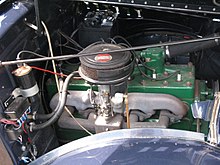The Volvo Group is a Swedish multinational manufacturing corporation headquartered in Gothenburg. While its core activity is the production, distribution and sale of trucks, buses and construction equipment, Volvo also supplies marine and industrial drive systems and financial services. In 2016, it was the world's second-largest manufacturer of heavy-duty trucks with its subsidiary Volvo Trucks.

The straight-six engine is a piston engine with six cylinders arranged in a straight line along the crankshaft. A straight-six engine has perfect primary and secondary engine balance, resulting in fewer vibrations than other designs of six or fewer cylinders.
The straight-five engine is a piston engine with five cylinders mounted in a straight line along the crankshaft.

Volvo Car AB, trading as Volvo Cars is a Swedish multinational manufacturer of luxury vehicles. Volvo is headquartered in Torslanda, Gothenburg. The company manufactures SUVs, station wagons, and sedans. The company's main marketing revolves around safety and its Swedish heritage and design.

The Volvo S60 is a compact executive car manufactured and marketed by Volvo since 2000.

The Volvo S80 is an executive car produced by the Swedish manufacturer Volvo Cars from 1998 to 2016 across two generations. It took the place of the rear-wheel-drive S90 as Volvo's flagship sedan.
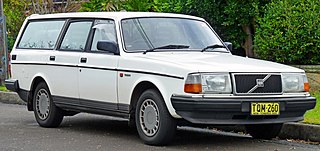
The Volvo 200 Series is a range of mid-size luxury cars produced by Swedish company Volvo Cars from 1974 until 1993, with more than 2.8 million total units sold worldwide. Like the Volvo 140 Series, from which it was developed, it was designed by Jan Wilsgaard.
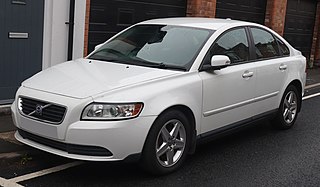
The Volvo S40 is a series of subcompact executive cars marketed and produced by the Swedish manufacturer Volvo Cars from 1995 to 2012, offered as a more mainstream alternative to the compact executive Volvo S60 to compete in a lower pricing bracket. The S40 was more or less positioned against premium-leaning small family cars like the Volkswagen Jetta as well as some mass-market large family cars.

The Volvo PV800 Series is a taxicab manufactured by Volvo from 1938 until 1958. The Sow series dominated the Swedish taxicab market during the 1940s and 1950s.

A transverse engine is an engine mounted in a vehicle so that the engine's crankshaft axis is perpendicular to the direction of travel. Many modern front-wheel drive vehicles use this engine mounting configuration. Most rear-wheel drive vehicles use a longitudinal engine configuration, where the engine's crankshaft axis is parallel with the direction of travel, except for some rear-mid engine vehicles, which use a transverse engine and transaxle mounted in the rear instead of the front. Despite typically being used in light vehicles, it is not restricted to such designs and has also been used on armoured fighting vehicles to save interior space.

The Volvo ÖV 4 was the first car built by Volvo. The designation ÖV 4 stands for "Öppen Vagn 4 cylindrar" in Swedish, which means Open Carriage, 4 cylinders. The model ÖV 4 has later often been referred to as "Jakob" but that was just a name for one of the 10 pre-series ÖV 4 that was ready on 25 July 1926, Jakob's name day. All 10 prototypes were assembled in Stockholm at the company AB Galco, Hälsingegatan 41 where Gustaf Larson worked at that time. Only one of the 10 pre-series cars manufactured during 1926 was saved for posterity and is housed at the Volvo Museum in Gothenburg, Sweden.

The Volvo PV 36 Carioca is a luxury car manufactured by Volvo Cars between 1935 and 1938. The word Carioca describes someone from Rio de Janeiro, Brazil, and was also the name of a dance that was fashionable in Sweden at the time when the car was introduced.
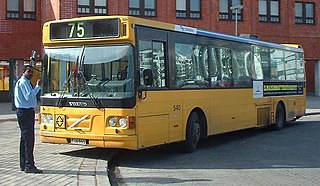
The Volvo B10BLE is a rear-engined low-entry single-decker bus chassis manufactured by Volvo in Sweden between 1993 and 2004. The first prototypes were built in 1992, but mass production started in 1993, only a year after the high-floor B10B. It was popular in Australia, Scandinavia and the United Kingdom. It had the engine mounted on the rear overhang of the bus. It became the successor of the city bus version of the B10B and was used as a base for single-decker buses worldwide. The B10BLE was available in diesel powered format, and later in a compressed natural gas powered format with the fuel tanks on the roof of the bus. Its low-floor design was widely promoted by Volvo when it was first launched, on the basis of added convenience to the passengers, and the increase in transport efficiency due to the low-floor design.

The Volvo PV51 is a car introduced by Volvo in December 1936. It was replaced by the mildly restyled PV53 in 1938. This car remained in production until the end of the Second World War.
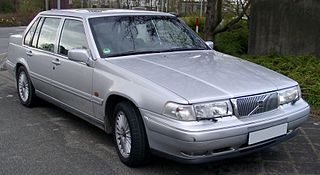
The Volvo 900 Series is a range of executive cars produced by the Swedish manufacturer Volvo Cars from 1990 to 1998. The 900 Series was introduced in 1990 to replace the 700 Series from which it derived. Prior to the end of its production, the 960 was renamed as the Volvo S90 (saloon) and Volvo V90 (estate), and the 940 was renamed 940 Classic, becoming the last rear-wheel-drive cars from Volvo, until the 2023 Volvo XC40.

The Volvo PV60 is an automobile manufactured by Volvo between 1946 and 1950. It was the first car produced by the Swedish company after the end of the Second World War.

The Volvo PV650 Series is an automobile manufactured by Volvo between 1929 and 1937. The model name stand for PersonVagn, 6 cylinders, 5 seats; the third digit indicates the version.

The Volvo TR670 Series is a taxicab manufactured by Volvo between 1930 and 1937. The model name stands for TRafikvagn ("taxicab"), 6 cylinders, 7 seats; the third digit indicates the version.

The Volvo LV60-series was a light truck produced by Swedish automaker Volvo between 1929 and 1932.
